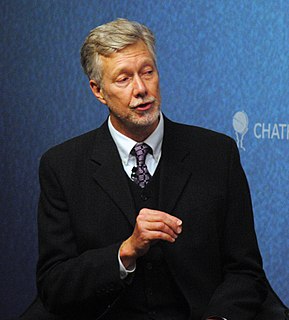A Quote by Warren Buffett
Somebody's buying these treasury bills at 1/20th of one percent. Consuming about $2 billion a day of goods and services beyond what we're producing. In other words, the rest of the world sends about $2 billion a day net of something.We got to send them something in return, don't we. So we send them little pieces of paper.
Related Quotes
Somebody's buying these treasury bills at 1/20th of one percent. I mean we consuming about $2 billion a day of goods and services beyond what we're producing.As long as we consume more than we produce, and we trade away little pieces of the country daily, they're going to own something. Now, they can't run from American assets. I mean every day the rest of the world is going to have about two billion more of American assets than we have, as long as they sell us these goods.
That would be nice if [people] stuck [treasury bills] all under a mattress, but they got to buy something with them. Sometimes they buy a treasury note, sometimes they set up sovereign wealth funds. They can do all kinds of things. They can buy our companies here. As long as we consume more than we produce, and we trade away little pieces of the country daily, they're going to own something. Now, they can't run from American assets. I mean every day the rest of the world is going to have about two billion more of American assets than we have, as long as they sell us these goods.
Confidence is key. You're not going to leave your money with me unless you're confident I'm going to give it back to you. And at this point, when treasury bills, seven day treasury bills at 1/20th of one percent, it's not because people want to earn 1/20th of one percent, it's because they trust the fact the treasury will give it back to them next week.
It doesn't matter how many televisions and computers and pieces of stereo equipment the Chinese send to us, even if they're sending them to us only in return for some funny, little, green pieces of paper. That is a balanced trade. They got what they wanted: the green pieces of paper. We got what we wanted: the plush toys, the computers, the stereo components.
At any time, somebody can blow themselves up and take Americans with them. They can blow up an airplane; they can crash an airplane. That's something we have to worry about every day - we spend 40 billion dollars yearly on homeland security. That has nothing to do with Crusades or any of that other nonsense.
Yes, twenty-seven million in slavery is a lot of people, but it is just .0043 percent of the world's population. Yes, $23 billion a year in slave-made products as services is a lot of money but it is exactly what Americans spent on Valentine's Day in 2005. If humans trafficking generates $32 billion in profits annually, that is still a tiny drop in the ocean of the world economy.
U.N. officials said today they desperately need $7 billion to help people cope with disasters, but they're having a hard time getting people to send rescue money. Here's what the UN should do: Invest in bad mortgages, run a bank into the ground, give yourself a bonus, get some spa treatments and, in no time, the government will send you $750 billion.
The collective shortfall of the 3.08 billion people (47 percent of world population) who, in 2005, lived below $2.50 per day was $507 billion per annum, which indeed comes to about two-thirds of the present US military budget. This gives us a rough sense of how much the eradication of poverty would cost.
At the beginning of the 20th century, there were less than 3 billion people on the earth, closer to 2 billion. By all measures that we can come up with right now,. with the lifestyle and consumption pattern of the Western industrial civilization, we can probably sustain about 2 billion people on this earth. We already have over 6 billion. China and India are aspiring to come on as industrial nations, aspiring to the lifestyle of the Western world, and it simply can't happen.






























